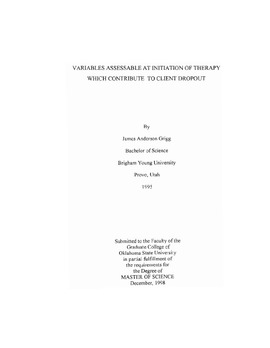| dc.description.abstract | Clients who dropout of therapy have long been a concern. Dropping out of therapy can create difficulties for therapists through wasted time and paperwork, disrupted schedules, forfeited income, and injuries to the therapist's well being and sense of competence (Bischoff & Sprenkle, 1993). More importantly, dropping out may be deleterious for clients. The loss of services may decrease the client's ability to cope with serious problems such as familial abuse or mental illness. Research assessing predictive variables of client attrition in family, marital, and individual therapy is needed to better equip therapists to serve their clients. The current study is composed of an ongoing database of more than 400 cases from a training clinic associated with a COAMFTE M.S. program. The purpose of this study is to identify client variables at initiation of therapy which will allow the clinician to efficiently distinguish between clients who are likely to dropout or continue in therapy. Related to this, is the objective of identifying how therapist variables and factors related to the process of therapy may contribute to the occurrence of dropout. Such information could be useful in helping the therapist to adjust his/her treatment plan, decreasing the likelihood of client dropout and thereby providing greater benefit to therapist and client. | |
